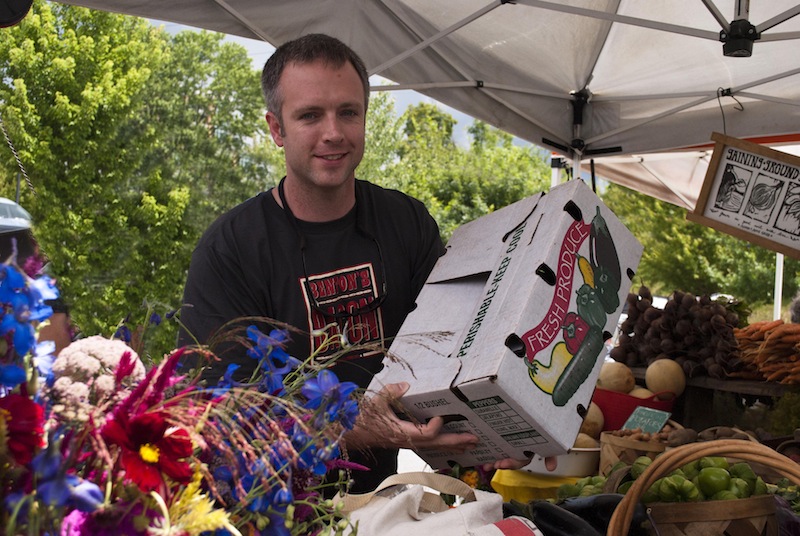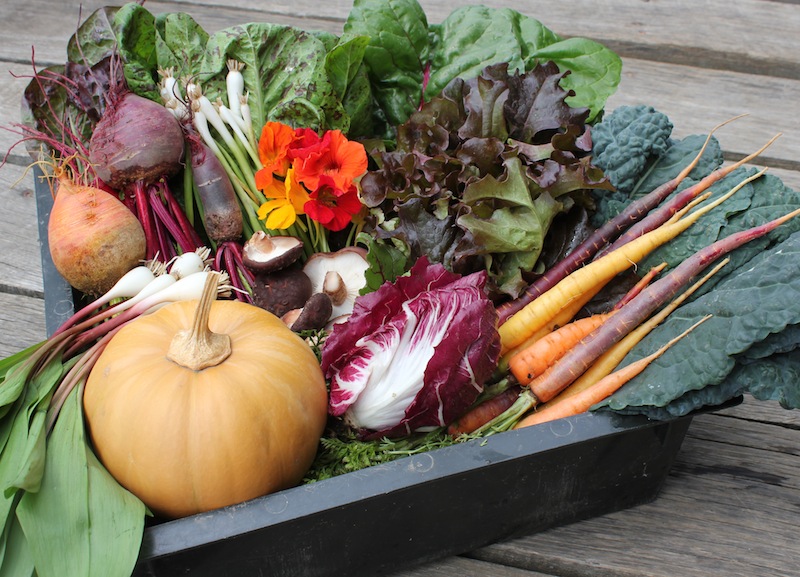
A quick guide to today’s Community Supported Agriculture programs
What is a CSA?
Community Supported Agriculture (CSA) is a great way to enjoy fresh, locally grown food and connect with the farmers growing it. Family farms offering traditional CSAs provide the chance to sign up for a season and receive a steady supply of farm-fresh food.
Think of it using this business analogy: You pay a farm in advance for “shares” of its forthcoming bounty. Then, throughout the spring and summer (sometimes fall and winter, too), you get your “return on investment”: a box of fresh fruits and veggies. Many CSA programs also include add-on options such as meats, eggs, cheese and fresh-cut flowers. Traditionally, subscribers pick up their CSAs once weekly at a convenient central location — on the farm or at a tailgate market, for example.

Changing CSA Models
Today, a growing number of CSA farms are moving beyond the traditional model. Many farms now offer varied subscription sizes (learn more in the CSA glossary) and flexible sign-ups, including pay-as-you-go options.
One new model turning the traditional approach somewhat on its head is the “market-style CSA.” In this program, you still pay up front, but the farmer doesn’t pack your box. Instead, you go to the farm’s tailgate market display and choose exactly what you want each week. The cost (often at an adjusted CSA rate) is deducted from your balance.
As we address with our business analogy, most CSAs are built on the idea of up-front investment to help with seasonal expense. But today, you’ll also find farms with weekly, monthly or other flexible payment plays, and still other farms that let you subscribe and unsubscribe month by month. Some farms also offer working shares, giving you a discounted subscription rate in exchange for lending a helping hand with farm chores.
Emerging CSA trends also include more flexibility when it comes to pickups. Many farms will deliver boxes directly to a workplace or community group. You can organize a group CSA though individual CSA farms or with the help of ASAP’s new pilot CSA outreach initiative, Mountain Community Supported Agriculture Association (MCSAA; email mike@asapconnections.org). Some CSA programs even offer home delivery, sometimes free, sometimes for a fee.
Even if you’ve shied away from subscribing in the past, these new approaches from innovative farmers may make it the right time for you to become a proud CSA member. Be sure to ask a potential CSA farmer about their approach and what makes them unique.
Pull-Out Boxes
CSA glossary
CSA: A weekly supply, typically pre-packed in a produce box, of farm-fresh food — from produce to meat to eggs to flowers. The typical CSA season is spring and summer.
Full or whole share: A full, or whole, share is the standard box of food provided by a CSA farm. Depending on the farm and your eating habits, a full share is likely to feed a family of four (two adults and two children).
Half share: Many farms offer a half-share option, a smaller weekly portion of food for one- or two-person families or for those who don’t cook very often each week. Half share not offered? Just buy a full share, split the cost with a neighbor or coworker, and take turns picking up your local food. You may also be able to find a farm that provides a full share every other week.
Fall and/or winter share: The typical CSA season includes spring and summer, but some farms and programs offer an extended season to subscribers or may even only offer a winter option. Keep in mind that variety is a little more limited during the fall and winter. Boxes are likely to include greens, root veggies and winter squash. These shares may come on a weekly basis, or they may come less often and contain a larger amount of great local food to eat and store all winter.
ASAP’s CSA Fair
March is a great time to sign up for a CSA, as some begin in late April and farms can sell out of shares. ASAP’s CSA Fair on March 21 from 3 to 6 p.m. in the Haywood Park Hotel Atrium, is an opportunity to meet CSA farmers face-to-face and learn more about their programs and products. Many of the farms represented in these pages will be there. You can sign up to learn more from farmers or bring your checkbook and subscribe on the spot. Participating farms all have pickup locations in Buncombe County. The event is free and open to the public. A cooking demonstration and children’s activity are also planned. More information can be found at asapconnections.org and fromhere.org.



Before you comment
The comments section is here to provide a platform for civil dialogue on the issues we face together as a local community. Xpress is committed to offering this platform for all voices, but when the tone of the discussion gets nasty or strays off topic, we believe many people choose not to participate. Xpress editors are determined to moderate comments to ensure a constructive interchange is maintained. All comments judged not to be in keeping with the spirit of civil discourse will be removed and repeat violators will be banned. See here for our terms of service. Thank you for being part of this effort to promote respectful discussion.